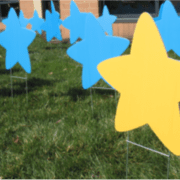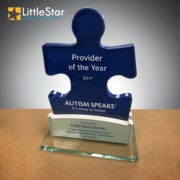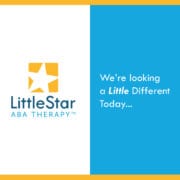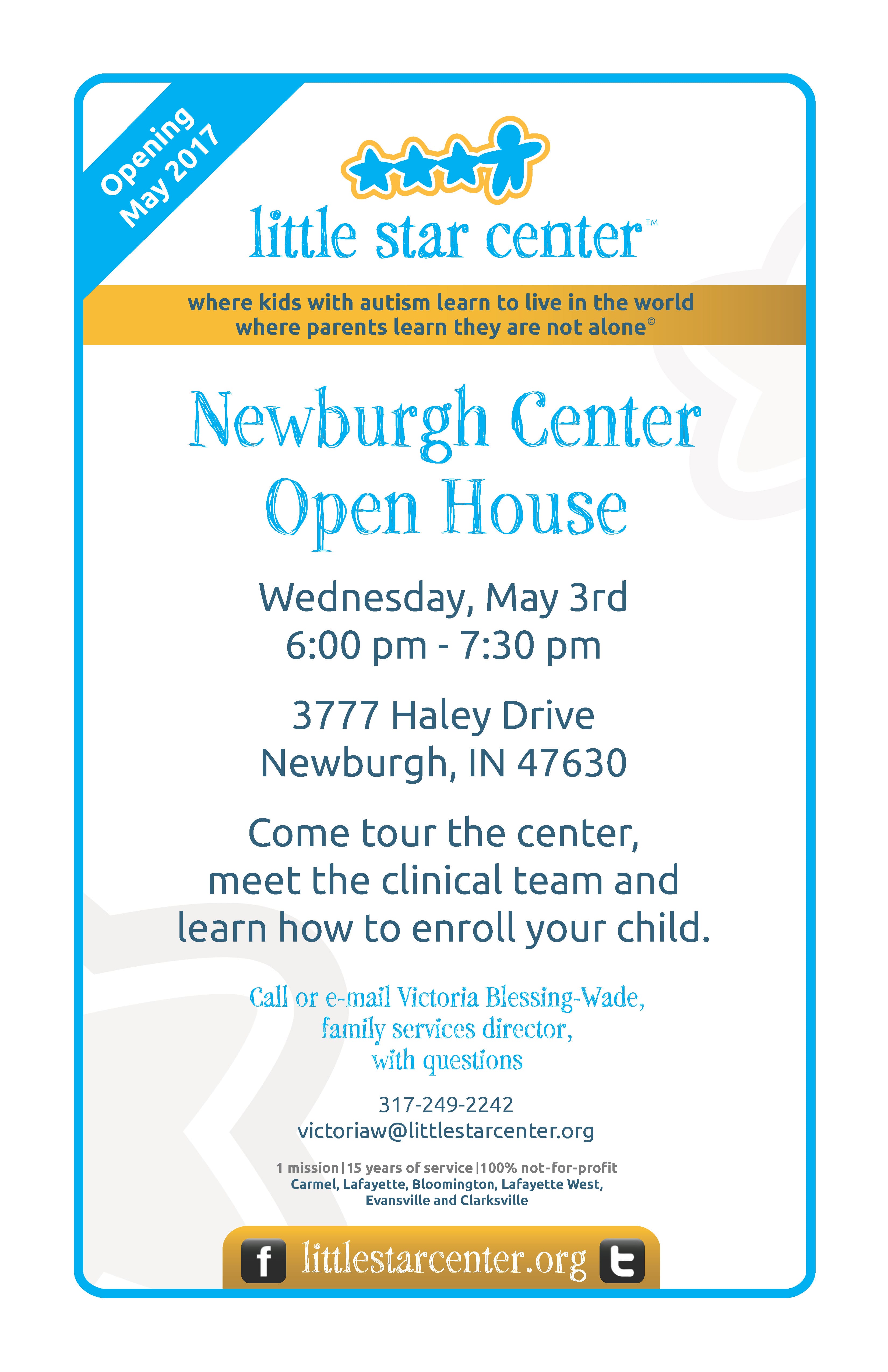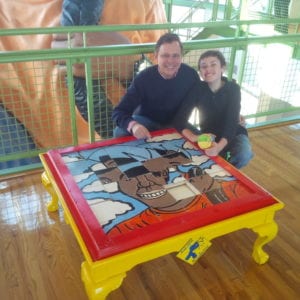Zionsville Dad Wins Important Victory for People with Autism
One of the original LittleStar families in 2002 recently fought Indiana Medicaid all the way to the Indiana Court of Appeals and won! Their victory is paving the way for other adults with autism to receive treatment that is too costly for most families to afford.
Tom Blessing and Victoria Blessing-Wade continue to advocate for their son, Connor, 24, who benefits from applied behavior analysis (ABA) therapy. Medicaid paid for Connor’s ABA therapy until his 21st birthday but denied payment after that based on his age. Connor had made significant strides with ABA therapy, and his family wished for him to continue.
Blessing, an education attorney, sued the Indiana Family and Social Services Administration on Conner’s behalf in Boone Circuit Court in July of 2020. The suit claimed Medicaid, under the direction of FSSA, arbitrarily denied Connor benefits for medically necessary treatment based on his disability.
FSSA previously deemed ABA therapy necessary for Connor until he turned 21 and then denied coverage of therapy solely based on his age. In her opinion in May, 2021, Boone Circuit Court Judge Lori Schein wrote “… The court concludes that the only individuals affected by the age restriction for ABA therapy are individuals with autism,” Schein wrote, adding, “Thus, the denial of Connor’s ABA therapy is a denial on the basis of his disability – autism.”
A denial based on disability violates the Americans with Disabilities Act (ADA) and federal Medicaid law, Schein ruled. “… The cost of ABA therapy is not a valid reason to impose an age restriction on coverage,” the appeals court decision reads. “Budgetary concerns … do not outweigh Medicaid recipients’ interests in access to medically necessary healthcare, leading the courts to conclude that the age restriction denies access to medically necessary services in violation of federal law.”
FSSA appealed the ruling but recently lost when the appeals court upheld the ruling about using age to determine benefits. While Medicaid can no longer deny Conner on the basis of his age, but they could deny ABA therapy to others based on age because the rule is still on the books.
“Just because the judge ruled it’s unlawful and discriminatory doesn’t mean it no longer exists,” Blessing said. “We’re just one step closer.”
Now the rule, part of Indiana Administrative Code, will have to be repealed or edited to remove the age restriction by the Indiana General Assembly, Blessing said.
“What families have to do,” until then, Blessing said, “is submit a claim and make Medicaid deny it on the basis of age before they can challenge it. … If they deny it on other grounds, medical necessity, for example, this decision doesn’t apply.
As LittleStar celebrates its 20th anniversary this year, this is a great reminder that while we have accomplished a lot, there is still work to do. LittleStar will continue to fight for every person with autism.
2022 Big Stars for LittleStar Campaign Kicks Off
Since 2002, LittleStar has impacted the lives of thousands of children, teens, adults and families living with autism.
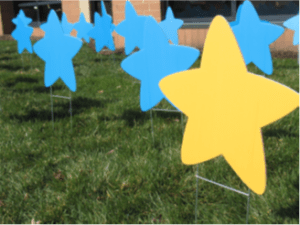
Please join us in April as we celebrate Autism Awareness Month with our Big Stars for LittleStar event.
Each LittleStar center will be planting a Star Garden of blue and gold stars to represent the current prevalence rate of autism—1 in 44. Each star honors a Big Star – people with autism, as well as individuals and organizations that support children and families affected by autism.
New this year businesses can show their support of people with autism by planting a Star Garden at their location. Let your employees and customers know that you support individuals on the autism spectrum and their families. LittleStar will supply everything you need and even help you plant your garden!
Did you know that autism is the fastest growing developmental disability in the United States? Your support makes it possible for LittleStar to help individuals with autism reach their goals and dreams. Thank you for being a Big Star for LittleStar!
Purchase your star today! If you have any questions or need additional information, please contact Jill Vaught at [email protected].
Workshop tackles challenges of writing medically necessary treatment plans for autism
As many individuals throughout the United States can attest, getting insurance coverage for certain conditions can best be described as another form of hell. And it’s especially the case for many individuals with autism.
Treatments, even when shown to be effective, are regularly rejected. As one couple recently told Capital Public Radio, their insurance provider rejected their adult son’s ABA treatment because it was “not medically necessary based on recent and relevant scientific evidence.”
LittleStar ABA Therapy is addressing many of those challenges with the workshop, “Navigating the 10th Circle of Hell: A Roadmap to Writing Medically Necessary Treatment Plans.” The workshop is 9 a.m.-5 p.m. on Jan. 19, 2018, and can be attended online or in person at the Public Forum Room, National Louis University-Lisle Campus, 850 Warrenville Road, Lisle, Ill.
The one-day workshop provides tips for writing successful treatment plans that support medical necessity for health-insurance funded individuals with autism. These letters of medical necessity (LOMN) are reviewed by insurance companies or governmental agencies in determining whether to approve coverage for treatment.
The workshop will be led by Tim Courtney, MS, BCBA, the COO for Little Star Center, a non-profit organization based in Indiana.
Courtney regularly advocates for ethical billing, the enforcement of insurance mandates and medical necessity documentation. In 2006, he earned a master’s degree in applied behavior analysis from the Florida Institute of Technology (FIT). In addition to earning his certification as a behavior analyst, he has been an instructor in the ABA department of FIT since 2008.
The topics covered during the workshop include:
- How to organize all of the steps of a medically necessary treatment plan from pre-authorization through re-authorization.
- How to state the necessary components of a comprehensive and focused treatment plan to meet medical necessity.
- How to review diagnostic reports, behavioral assessments and the written treatment plan to ensure they justify medical necessity.
To sign up for the workshop, visit https://www.eventbrite.com/e/navigating-the-10th-circle-of-hell-a-road-map-to-writing-medically-necessary-treatment-plans-tickets-39091725403
Need help developing more compelling medically necessary treatment plans for autism?
As most of the nation fixates on the future of health insurance, clinicians and other professionals in the field of autism care continue their ongoing battle to make a case for coverage of treatments like applied behavioral analysis (ABA).
Just recently, Capital Public Radio in Sacramento reported that California patients are facing insurance denials in record numbers — nearly triple. In many of those cases, families are fighting to get coverage for autism treatment. One family was told by their insurance provider that their adult son’s ABA treatment was “not medically necessary based on recent and relevant scientific evidence.”
In response to the challenges, LittleStar ABA Therapy is hosting a one-day workshop to provide clinicians with tips on writing successful treatment plans that support medical necessity for health-insurance funded individuals with autism. These letters of medical necessity (LOMN) are reviewed by insurance companies or governmental agencies in determining whether to approve coverage for treatment.
The workshop, aptly named “Navigating the 10th Circle of Hell: A Roadmap to Writing Medically Necessary Treatment Plans,” is scheduled for 9 a.m.-5 p.m., Jan. 19, 2108, in the Public Forum Room, National Louis University-Lisle Campus, 850 Warrenville Road, Lisle, Ill. The workshop also offers an online option for those unable to attend in person.
The workshop will be led by Tim Courtney, MS, BCBA, the COO for Little Star Center, a non-profit organization based in Indiana.
Courtney is an advocate for the enforcement of insurance mandates, medical necessity documentation and ethical billing. He has a master’s degree in applied behavior analysis from the Florida Institute of Technology (FIT). In addition to earning his certification as a behavior analyst, he has been an instructor in the ABA department of FIT.
The topics covered during the workshop include:
- How to organize all of the steps of a medically necessary treatment plan from pre-authorization through re-authorization.
- How to state the necessary components of a comprehensive and focused treatment plan to meet medical necessity.
- How to review diagnostic reports, behavioral assessments and the written treatment plan to ensure they justify medical necessity.
To sign up for the workshop, visit https://www.eventbrite.com/e/navigating-the-10th-circle-of-hell-a-road-map-to-writing-medically-necessary-treatment-plans-tickets-39091725403
LittleStar ABA Therapy Receives Coveted Autism Speaks “Provider of the Year” Award at 11th Annual Autism Law Summit
Carmel, Indiana – LittleStar ABA Therapy (formerly Little Star Center) was the proud recipient of the 2017 Autism Speaks Provider of the Year Award at the Autism Speaks Annual Autism Law Summit, which took place on October 27th -28th in San Diego. The Autism Law Summit brings together parent advocates, autism service providers, lawyers, individuals with autism, lobbyists, and legislators from across the United States to discuss the policies associated with autism spectrum disorder.
The Provider of the Year Award is not given out every year. This year, Vice President of State Government Affairs at Autism Speaks, Lorri Unumb, on behalf of Autism Speaks, honored LittleStar ABA Therapy with the nation’s ‘Provider of the Year’ award in appreciation of exceptional advocacy on behalf of individuals with autism.
LittleStar ABA Therapy is based in Indiana with six ABA therapy center locations across the state. LittleStar is the longest running ABA provider in the state of Indiana opening its doors in 2002. The organization operates as a non-profit, and supports efforts to raise funds to help their families when insurance issues arise. LittleStar ABA Therapy also has a dedicated national advisory board that includes some of the foremost experts in the field of autism and ABA.
The mission of Little Star ABA therapy is to inspire, serve, and guide all those touched by autism to achieve a better reality. As LittleStar’s Chief Operations Officer, Tim Courtney, explains, “Our goal is to help individuals with autism to learn not just to live, but to thrive in the world.”
“We offer a warm, welcoming environment,” says Mary Rosswurm, Executive Director of LittleStar ABA Therapy and mother of an adult with autism, “and we’re fortunate in having a team of caring professionals with the highest credentials to provide ABA therapy for our children, teens and young adults.”
And as for being awarded Autism Speaks Provider of the Year: “We couldn’t be more proud!”
To find out more about LittleStar, visit the website at: https://www.littlestaraba.org
LittleStar ABA Therapy
Contact Name: Mary Rosswurm
Email: [email protected]
317.249.2242
We’re Looking a Little Different Today…
You just might’ve noticed that we have a whole new appearance! That’s because we celebrated our 15th birthday in September, so we’ve adopted a little more grown-up look — refreshing our brand to appropriately salute our evolution from 2002 to where we are today.
Yesterday, we were Little Star Center. Today, we are LittleStar ABA Therapy … Our kids have grown up over the past 15 years, and so have we. But we’ll always be the place “Where individuals with autism learn to live in the world. Where families learn they are not alone.”
Why the change? Great question. In a nutshell, people weren’t sure what it was we did, or who we served. And Little Star Center has evolved into so much more over the years, and we’re very proud of that. (And very grateful for each and every individual who’s been with us or helped us along the way.) We’re providing Real Care, Real Advocacy and Real Progress to individuals with autism and to the ABA community as a whole. (And, heads up, you’ll hear those words — Real Care, Real Advocacy, Real Progress — more and more. We’re living by them in every little thing we do.)
Today, LittleStar ABA Therapy is an active, esteemed contributor to both the local and national ABA communities. Our leadership team includes some of the most respected minds in behavior analysis. Mary Rosswurm, Tim Courtney, Vince LaMarca and Breanne Hartley even wrote the book on the subject, The Training Curriculum for Supervisors of ABA Technicians in Autism Programs (1597380989), and its corresponding training manual on how to supervise behavior technicians with Dr. Denny Reid, a nationally recognized expert on staff training and supervision. The leadership team has already begun conducting workshops throughout the nation on this curriculum. Likewise, our board of advisors are renowned ABA experts, at the forefront of autism information, studies and practices.
This evolution has helped non-profit LittleStar offer greater resources to our learners than ever before:
- We provide Real Care to learners through assessments and therapy based on the latest ABA science. And we offer compassion and guidance to families, whom we regard as our own.
- Through Real Advocacy, we present at national conferences, lobby for the rights of those with autism, and work to get medically necessary ABA therapy hours approved by health insurers. Barring approval or given an inability to pay, we can help pay for therapy hours using our LittleStar Care, Advocacy and Progress (CAP) Fund (formerly our “scholarship fund”). (Please consider contributing if you can!)
- We’re committed to achieving Real Progress with every learner via ABA therapy, setting them on personal paths to success and helping them reach goals that better their lives — and their families’ — now and in the future.
Please connect with us socially and through our newsletter (sign up below), browse our site to see what’s new, and consider contributing to our CAP Fund to ensure that every learner reaches their fullest potential.
Get Our Newsletter >
Meet the Little Star clinical team at our May 3 Newburgh Center open house!
Little Star is proud to invite the community and prospective Little Star parents to tour our newest center in Newburgh.
On Wednesday, May 3, from 6 p.m. to 7:30 p.m., we welcome you to come check out our latest ABA therapy center, meet our clinical team and learn how you can enroll your child to be a part of the Little Star family.
You can find us at 3777 Haley Dr., Newburgh 47630.
Have questions? Please direct to them to our family services director, Victoria Blessing-Wade, at 317-249-2242 or [email protected].
We can’t wait to meet you!
Former Autism Speaks leader joins Little Star Center
Dan Unumb, former executive director of the Autism Speaks Legal Resource Center, is now a part-time contractor working in partnership with Little Star Center.
Dan is advocating for families at Little Star Center and throughout the state as they face legal challenges with insurance coverage. He also is in the development stages of a new Autism Legal Resource Center to support families impacted by autism across the country. Dan and his wife, Lorri, have a son, Ryan, who is impacted by autism. Dan is passionate about his work with Little Star Center and long-term goal to create a national Legal Resource Center. Read on to learn more about Dan’s work.
What attracted you to joining Little Star Center? Innovative and talented personnel. Mary (Rosswurm) has great vision and Tim (Courtney) has expertise. Everyone has a commitment to quality services and wanting to do more. I am grateful for the Board of Directors at Little Star Center for their foresight in ensuring that the Autism Resource Center continues on now that Autism Speaks has decided to discontinue it.
What will be your primary role for Little Star Center? To provide legal analysis of autism treatment coverage issues and legislation and consult with clinicians to be sure that families do not face undue barriers to their treatment or limitations to their treatment that are not allowed under their insurance plan.
How did you get into this field of work? My 15-year-old son, Ryan, was diagnosed with autism at the age of 2. At the time, I was an attorney with the U.S. Department of Justice. While my wife, Lorri, and I had great insurance, we found that it did not cover ABA therapy, even though every autism expert recommended it.
Lorri and I literally worked to pay for ABA therapy for Ryan. It’s basically you, a checkbook and a therapist. We sold our house and moved to South Carolina to be near family and have a home that was less expensive. When we took a breath, we realized ABA therapy is medically necessary and there should be insurance coverage – and there should be insurance coverage to pay for it.
We found a clause under Medicaid and started to work on getting coverage in South Carolina. We formed groups, pooled our money and met with legislators. After we got a bill through both the house and the senate in South Carolina, the governor vetoed it. This was in 2007. We got people to rally at the last minute to get the veto overwritten. This bill is now known as Ryan’s Law.
Since that time, we have created a national summit where professionals come together to address various laws and insurance coverage requirements. I ended up working for Autism Speaks, where I was the executive director of the Legal Resource Center until it was discontinued late last year. Lorri continues to serve as vice president of government of affairs.
What will the legal resource center provide to families when it is established? The benefits will be direct and indirect. We will have an educational emphasis where we educate and train other lawyers in this area. We will provide resources for parents to help them understand what they can do on their own behalf and offer them a broad network of attorneys in which they can use (for insurance issues).
What do you think is the biggest challenge facing families seeking ongoing ABA therapy for their child with autism? The healthcare law and what is going to happen nationally with Medicaid and private insurance will impact all of us. Families need the tools and rights to ensure coverage for this medically necessary condition. It will be important to have a state law mandate that includes broad coverage.
What do you enjoy most about serving families affected by autism? Everyone’s path is different and I appreciate that more and more—from behavior issues to non-verbal challenges. I feel a kinship with these parents. I enjoy the impact we can make with our advocacy work. It advances the ball. It will have a lifelong impact for the children directly involved and for their families and future generations.
Little Star Center expands autism services in Indiana with two new locations
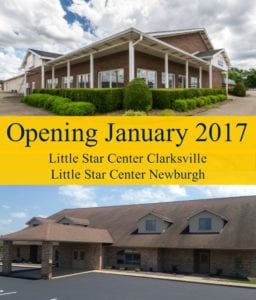 Little Star Center, Indiana’s first center-based, therapeutic applied behavior analysis (ABA) provider serving children to young adults with autism, announces today it is expanding autism services in Indiana by adding two new locations to its system of statewide ABA facilities. Little Star Centers in Clarksville and Newburgh will staff up to 100 new jobs in the southern Indiana communities. The new centers are scheduled to open in January 2017 and bring the total number of Little Star Center facilities in the state of Indiana to six.
Little Star Center, Indiana’s first center-based, therapeutic applied behavior analysis (ABA) provider serving children to young adults with autism, announces today it is expanding autism services in Indiana by adding two new locations to its system of statewide ABA facilities. Little Star Centers in Clarksville and Newburgh will staff up to 100 new jobs in the southern Indiana communities. The new centers are scheduled to open in January 2017 and bring the total number of Little Star Center facilities in the state of Indiana to six.
Little Star Center has experienced continued and consistent growth in Indiana since opening its Carmel location in 2002 with just 10 learners and 15 employees. The Carmel location was the state of Indiana’s first center-based therapeutic ABA center. After nearly 15 years in operations, the organization has opened three additional centers: Lafayette in 2011, Bloomington in 2015 and West Lafayette in 2016. Services have expanded to include in-home therapy and community-based programming in addition to center-based ABA therapy.
“Our growth is directly related to the rising number of Hoosier children diagnosed with autism. Families of newly diagnosed children are joining the autism community each day, seeking medically necessary ABA therapy,” said Mary Rosswurm, executive director Little Star Center. “Our research shows families in southern Indiana communities will benefit from our personalized services, directed by some of the most experienced clinicians in the country. We look forward to changing the lives of more individuals and families impacted by autism.”
New jobs
Each Little Star Center will staff up to 50 team members for a total of 100 new jobs in Indiana. Little Star Center is currently accepting applications for various positions at both locations. Employment opportunities at each location include a center manager, an assistant clinical director with BCBA certification and therapists with a background in education, child psychology, special education, speech sciences and/or child development. Job descriptions and hiring information are available on our website.
About the new Little Star Center locations in Clarksville and Newburgh
Little Star Centers in Clarksville and Newburgh are scheduled to open in January 2017. The enrollment process requires working with a family’s insurance company and can take as long as 90 days to confirm benefits. Families seeking information and who are interested applying for ABA services at Little Star Center are encouraged to begin the process in the fall. Click here to learn about the Newburgh location. Click here to learn about the new location in Clarksville. Information sessions will be hosted in each city throughout the fall. Please review the information on the new center web pages for complete details.



